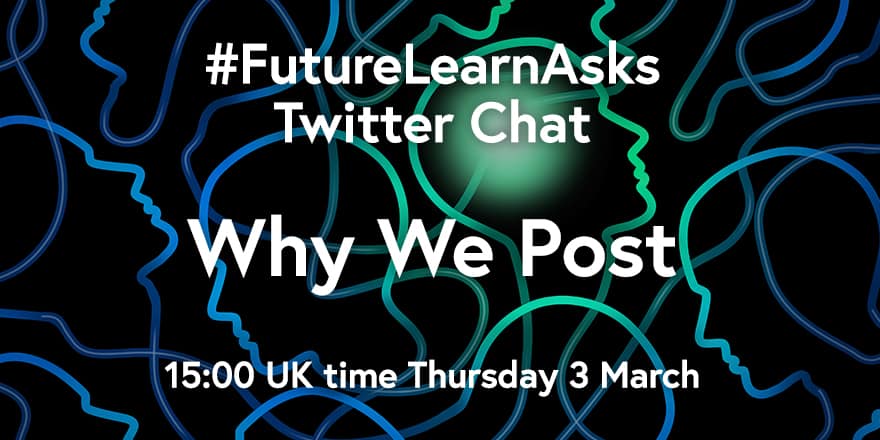#FutureLearnAsks: Why We Post – Global Social Media
Megan James, Marketing Executive at FutureLearn, introduces the subject for our next big Twitter chat: Why We Post – all about social media around the world.
Megan James, Marketing Executive at FutureLearn, introduces the subject for our next big Twitter chat: Why We Post – all about social media around the world.
As regular readers will know, each #FutureLearnAsks event is a chance for you to discuss and debate a big topic with leading experts and other learners, outside of the confines of a FutureLearn course. We love to hear from people all over the world, so we can all learn from your unique experiences and opinions. So far we’ve discussed a diverse range of subjects from mindfulness to fiction writing – and everything in between.
Join the next #FutureLearnAsks on 3 March
Social media impacts on everything from politics and relationships to education and work. Join the team of experts from our new online course Why We Post: The Anthropology of Social Media to discuss how people actually use platforms, if human communication has changed, and much more. From Trinidad to Turkey, and Chile to China, Why We Post unveils the truth behind social media behaviour around the world.
#FutureLearnAsks will take place on Thursday 3 March from 15:00 – 16:00 GMT. Click here to see the time in your location and then add the event into your calendar. All you need to join is a Twitter account.

Contributors for Why We Post: Global Social Media
 Daniel Miller
Daniel Miller
@DannyAnth
is Professor of Anthropology at University College London. He is author/editor of 37 books such as Social Media in an English Village.
 Juliano Spyer
Juliano Spyer
@Jasper
is doing a PhD social media at the Department of Anthropology, University College London, and wrote the first book about social media in Brazil.
 Laura Haapio-Kirk
Laura Haapio-Kirk
@LauraLHK
is a research assistant on the Why We Post team at University College London. She is managing the dissemination stage of the project and worked on the FutureLearn course.
How it works
To see what #FutureLearnAsks looks like in practice, you might like to review the highlights from the first session.
For an hour starting at 15:00 GMT, FutureLearn will tweet questions from @futurelearn. You can then respond to these questions by including #FutureLearnAsks in your tweets.
You’ll be able to follow the discussion by doing a Twitter search for the hashtag. This works whether on the website or in an app. If you ever get lost, just pay the FutureLearn Twitter account a visit.
Each question will be numbered Q1, Q2, etc, so when you respond, you should include the number of the question you’re responding to in your answer. E.g.
A2 This my answer to question 2. #FutureLearnAsks
You’re also encouraged to reply to other people’s tweets, and the guest contributors will be joining in too.
FutureLearn will retweet some of the most interesting contributions, and generally help to facilitate the conversation. We’ll create an archive of the discussion and share it after the event.
What to do now
Remember to put the time and date in your diary! And if you’re planning to take part, you could use the hashtag #FutureLearnAsks to introduce yourself right now.




